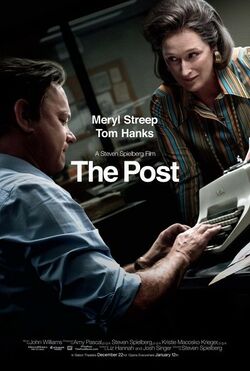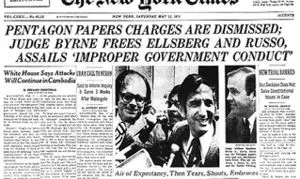How historically accurate is the movie The Post
The Post is a historical drama that depicts the publication of the Pentagon Papers that detailed thirty years of involvement by the United States in Vietnam. These documents had the effect of increased hostility to the war, as they demonstrated a negative view of the war by the US government at a time when the government gave a more positive view and increased the war effort. The film focuses on the publication of the papers and Katharine Graham, who was the first female publisher of a major US newspaper.
The film begins in 1966 when then Secretary of Defense Robert McNamara on a flight home from Vietnam expresses a negative view of the war effort in Vietnam and how it cannot be won. However, after arriving back in the US, McNamara gives a glowing review of the war effort. Daniel Ellsberg had gone with McNamara as part of a Pentagon review of the war effort, where Ellsberg had worked for the RAND Corporation in charge of the review. Ellsberg was dismayed while the government portrayed a different perception to the public out of fear for political fallout if the war effort failed.[1]
By 1971, the war had become less popular and the Washington Post, which was a major newspaper but needed financial stability and was trying to go public on the stock market, had come under the ownership of Katharine Graham. Ben Bradlee is the editor-in-chief and feels frustrated that the paper seems to always be bested by the New York Times in breaking major stories of the day. This seems to be the case, once again, when theTimes publishes an expose on the Pentagon Papers, including McNamara's role in covering up the war effort. As the Pentagon report was suppose to be classified, the government, now under President Richard Nixon, gets an injunction from the court to halt further publication and stories on the topic. Meanwhile, Ben Bagdikian determined that the ultimate leak of the story and papers was Ellsberg, as he had made copies of the report. Copies of the same information the Times had were given to the Post, which now creates a dilemma: If the Post further tries to publish the documents then they could also be in contempt of a court order and Katharine Graham, who is ironically perhaps a friend with McNamara, could be put in jail and her newspaper ruined.[2]
Ultimately, the Post decides to run the story and Graham takes a big risk, leading to a court case between the US government and the Times and thePost defending together, where the case makes its way to the Supreme Court. Newspapers then begin to run similar stories about the Pentagon reports, showing their backing for the newspapers' First Amendment rights. Ultimately, in a 6 to 3 decision, the Supreme Court rules in favor of the newspapers (Figure 1). The court was very critical of the government's interference in the papers' First Amendment rights, which they saw as critical in protecting democracy. The effect of the decision makes the Post not only vindicated but helped create it as a major national newspaper that continued to rival the New York Times.[3]
Key Characters
Katharine Graham: The character is a well known socialite and had come upon ownership of the newspaper with the death of her husband. Initially, she is shown as being unsure and less comfortable in her role. She agonized about publishing the Pentagon Papers not only because it could get her newspaper in trouble but also because it exposed deception by those who were her friends, including former presidents and McNamara. However, Katharine was a strong figure and she also thought about what was best for her paper and role in society, leading her to ultimately decide to run the story that continued exposure of the Pentagon Papers despite the advise of her lawyers warning not to publish. She was very much concerned with the effect the publication would have on the company's value, in light of the fact that she felt many did not see her as fit to run a major newspaper.[4]
Ben Bradlee: The movie depicts him as a determined figure trying to best theNew York Times, with his efforts often frustrated. Sensing an opportunity, Bradlee moves on the potential story that can expose the government's deception about the Vietnam War. Bradlee sees that the exposure of the story could benefit the newspaper and allow it to finally reach a prominent national level on par with its main rival newspaper. However, he also agonized about the story, realizing he and others could be found in contempt and put in jail.[5]
Daniel Ellsberg: The most central figure in exposing the story was Ellsberg. He took great risk and nearly went to jail for his efforts, as he was brought to trail on espionage charges, which were later dropped in light of the court ruling. Ellsberg also seems to be fearful on what would happen but sees it as his moral responsibility, given how the war effort had unfolded and the lack of progress in fully ending it.[6]
Neil Sheehan: Although not shown much during the film, he does play an important role as his exposure of the Pentagon Papers and other major stories is what caused the Post, and namely Bradlee, to be obsessed in catching up to their rival. In effect, he shapes much of the story but is not shown significantly.[7]
Richard Nixon: Another character that is an important player but having little camera time. In this case, his real voice was used in various parts of the movie. Nixon's paranoia, and eventually baring the Post from the White House was displayed throughout the movie. He leads the government's efforts in stopping the leak that could damage his efforts, even though most of the leak covers periods before he became president. Nevertheless, Nixon saw the press as attempting to bring down his administration. The irony in trying to repress major stories is shown at the end, when the Watergate scandal is eventually exposed and damaged the Nixon White House with the Post and other newspapers playing an important role once again.[8]
Historical Accuracy
The general story is largely accurate, in that the Pentagon Papers were leaked to the Times and eventually the Post played an important role in fully releasing the leak. The struggle the characters face in publishing the story also holds some truth, as there was a real threat that Katherine and her staff could have gone to jail. The movie also focuses on Katharine becoming the first female leader of a major US newspaper. The protagonist Bradley Whitford is shown opposing her leadership and publication of the story, but this character never existed and was used simply for dramatic effect. There were also other dramatic moments which did not happen, namely Katharine receiving the leaked documents on her birthday during a party for her. However, the biggest inaccuracy or at least misleading aspect of the movie is the fact the New York Times, which played a far more prominent role in exposing the leaked documents, receives relatively little credit. The Post took advantage of the fact the Times was prevented from publishing due to the court injunction. The important role of the Times in leaking the story was underplayed and many of those reporters, particularly Sheehan, played the critical role in bringing the story to light.
Summary
The Post is a recent historical drama of an event that helped shaped the public's perception of deception played by the government during the Vietnam War. The damage lasted for decades and the rise of the Washington Post is shown attributed to the role that Katharine Graham played in fighting prejudice and helping to leak a major story. While there are some misleading aspects of the movie, in minimizing the important role others played in the true story, the movie does do a relatively good job in showing perhaps the most important battle that tested First Amendment rights and government's attempts to repress a story by the press.
References
- ↑ For more on the role of Ellsberg in the Pentagon Papers, see: Ellsberg, D. (2003). Secrets: a memoir of Vietnam and the Pentagon papers. New York: Penguin Books.
- ↑ For more on Katharine Graham and her role in the story, see: Graham, K. (2017). The Pentagon papers: making history at the Washington Post. Vintage.
- ↑ For more on the court case against the Times and the Post, see: Rudenstine, D. (1996). The day the presses stopped: a history of the Pentagon papers case. Berkeley: University of California Press.
- ↑ For more on Graham, see: Graham, K. (2002). Personal history. London: Phoenix.
- ↑ Bradlee, B. (1997). A good life: newspapering and other adventures. London: Touchstone.
- ↑ For more on Ellsberg, see: Ellsberg, 2003
- ↑ For more on Sheehan, see: Sheehan, N. (1998). A bright shining lie: John Paul Vann and America in Vietnam. London: Pimlico.
- ↑ For more on the role of the Nixon administration and its role in the leak, see: Prados, J., & Pratt Porter, M. (Eds.). (2004). Inside the Pentagon papers: symposium at the National Press Club in June 2001 to commemorate the thirtieth anniversary of the Pentagon papers. Lawrence, Kan: Univ. Press of Kansas.

